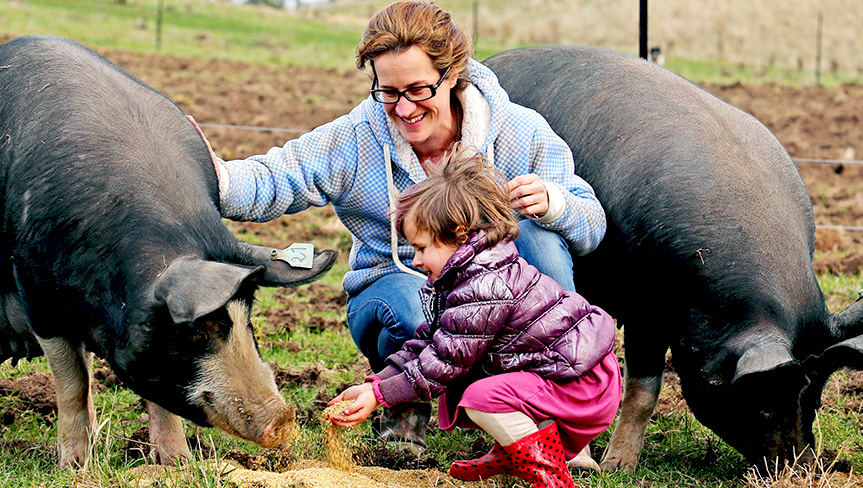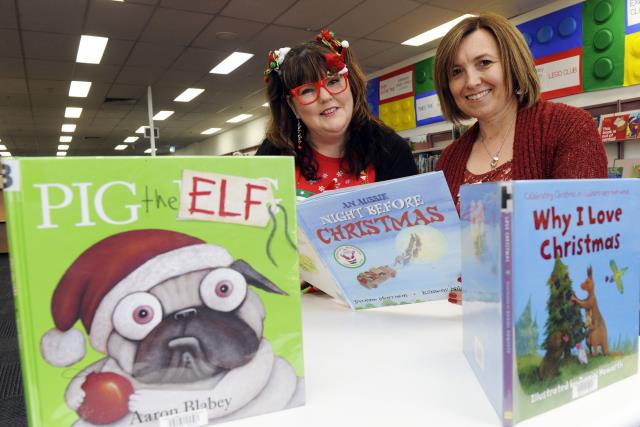Small scale livestock farmers tell about the trials and tribulations of starting and running their niche businesses.
ON A cold winter’s day, Abbey and Matt Brown just smile as they watch their four-year-old daughter Lyla running around after the piglets on their Springfield property.
While most children her age would run away from the animals, Lyla treats them more as pets.
“Lyla gets out in the paddock and she will go talk to them and scratch them,” says Abbey.
“When friends arrive she’ll be like ‘you can come out and see our piglets’.”
Seeing Lyla interact with the pigs is a bonus the couple didn’t expect when they decided to start their business, Springfield Pork, two years ago.
The home business keeps them busy selling pork, bacon, ham and other porcine products at farmers’ markets – something of a departure from Abbey’s previous career.
“I came from a mental health background and we’ve been in the area eight to nine years and on the farm for six years,” says Abbey.
“We were both Melbourne-based, so it was a whole new occupation for us.
“Matt still works full time as a plumber, so this is something extra which I can do while looking after the kids [Lyla and Reuben].”
The couple never thought the decision to raise and breed their own livestock for personal consumption would turn into a family business.
“We have 85 acres and prior to the arrival of the pigs we had some cows,” Abbey says.
“We decided to look at what livestock we could use the land for. Matt had an interest in doing prosciutto and I wanted to look at having pigs on the property. We got two pigs with the intention of just having our own meat.”
And so they joined a growing number of people wanting to raise their own meat in a move away from the supermarkets.
Instead of focusing on selling a product for the lowest price, farmers like the Browns are intent on providing free-range meat and a personal touch.
“We kept Peggy Pig and we then got a few more and started breeding from her,” Abbey says.
“We thought we would put in the infrastructure and sell [the products] at farmers’ markets. The business started with selling boxed pork. We thought about selling fresh pork at our local market [in Lancefield] but they already had two pork producers.
“We then found a different way to get into the market with a smoked and cured range of meat.”
The range includes smoked bacons, primal hams, pork necks, pork sausages, prosciutto, pancetta, capicola and salami.
“We are catering for a niche market and so we aren’t selling to stores as such [though they have products in a store in Woodend].
“Our goal is to provide our customers with a quality product raised in the conditions and environment in which our porcine mates should be raised: stress-free with soil to till, sun, huts to birth in and wallows to bathe in.
“We do three markets a month in Bundoora Park, Lancefield and Kyneton where most people come and get our meat.
“It’s nice being in the area and some people will often follow you on the trail. They’ll often go to both Kyneton and Lancefield if you haven’t got something when they want it.”
Over the hills in Myrniong, Louise Mawhinney is up at 4am to tend to the cows and sheep at Braelands Beef, which she runs with her husband Aaron.
Like the Browns, they raise and sell their own meat but focus on beef and lamb.
They sell bulk packs, which include steaks, mince, sausages and roasts.
While Aaron works a full-time job, Louise juggles motherhood and looking after the animals.
Although Riddells Creek-raised Louise has worked in the beef industry for many years she didn’t expect to be managing the land which has been in her family since 1878.
“We’ve been doing this for four years and really pushed it for the past two.
“We started by selling beef to our family and friends, and they told other people and we expanded,” she says.
“We have both cows and sheep. We just started with beef and people kept asking for lamb, so we started selling lamb on the side.”
Instead of focusing on farmers’ markets, they have a home delivery service.
“Most people who get our meat want to know where it has been grown. Many of our customers are young families who want to know what they are eating and where it has come from.’’
Despite an increase in popularity, neither farm is considering expanding its business.
“A lot of the cooking shows have helped the industry and people want good produce and want to know where it’s raised,” says Louise.
“Our cattle and sheep graze free range and hormone free on the native grasses. Our farming practices mean that we can grow our livestock as naturally as possible to provide a product that is sustainable, ethically grown and healthy. “We do not want to and are not able to produce huge quantities, so we focus on the quality of our product.”
Abbey Brown agrees, although the business is not without its challenges. “We are seeing more people wanting the product, but some people are still baulking at prices.
“We have to charge for our product and our biggest hurdle is communicating the free-range part and justifying the cost.”
Tony Nestorovski doesn’t sell meat he’s raised himself, but as part-owner at Station Street Meats in Werribee, he certainly knows a lot about the business.
“I used to be a washer kid here and then they gave me an internship. After about a year in I started to enjoy it,” he says.
“I wanted to start my own business about a year ago and then I got an offer to go into partnership here.”
Nestorovski says customers get service at the butchers that is not possible at a supermarket.
“We have regular clientele who know what they want,” he says.
“You get personal service here and [a product] doesn’t have to be straight off the shelf. A lot of the time, we slice the meat up for them.”
Nestorovski says he has seen a change in what people have been asking for over his 11 years at the store.
“There is definitely a different market which we have to cater for. There are a lot more different cultures in the area and we have to cater for everyone.
“Also we are starting to see the impact of television cooking shows. Things we have struggled to sell like pork belly and shoulders of lamb, which no one used to want, everyone now does, mainly because of television.”
While all three businesses have gained new customers, they all agree it’s a hard industry to work in, especially with big sellers dominating the market.
“As long as they keep coming back, that’s all we can ask for,” says Nestorovski.
Details:







